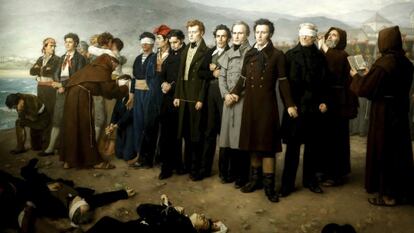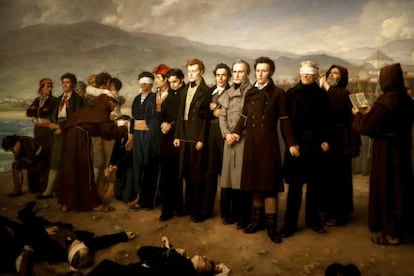Seeing the Prado in a new light
Major project to swap museum’s halogen lamps for LEDs brings details into sharp focus

The feeling is very similar to when you are contemplating a newly restored painting. It is as though all impurities have been removed, and the artwork has recovered its original splendor. In some cases, it may even seem excessively bright.
This is all thanks to the Prado Museum’s decision to change its halogen lamps for LEDs.
As a result, Goya’s famous Black Paintings no longer seem quite as dark, and the details created by the Aragonese artist’s paintbrush stand out much more clearly. Although the truth is, they were never that dark to begin with.
With halogen lights, backgrounds lose their definition; now works can be much better appreciated”
Miguel Falomir, new director of conservation
“They always had color and light, because Goya was a true master of light. His paintings received that name in the late 19th century, when dark subject matter in art was held in esteem, and it stuck. But it is a mistake,” explains Manuela Mena, head of conservation of 18th-century paintings and Goya.
This explanation comes toward the end of the presentation of an ambitious new project named Iluminando el Prado (or, Lighting up the Prado), funded by the Iberdrola Foundation at a cost of somewhere between €800,000 and €1 million.

The estimated completion date is 2017, when new lights will be installed in the 100 or so rooms that make up Madrid’s premier museum. Velázquez’s famous Las Meninas will be the last work to be bathed in the new light.
The 15 rooms devoted to 19th-century art and part of Goya’s work are already fitted with LEDs, as is the temporary exhibition room, which currently houses work by Flemish artist Van der Weyden.
Stopping in front of another famous Goya painting, The Second of May 1808, Mena notes that “the back of the painting was always like a curtain, an unimportant element, but now you clearly see a fire and all kinds of hues.”
For a while, the museum will combine the two kinds of lights – halogen and LEDs – on specific paintings so visitors can see the difference for themselves.
“With halogen lights, backgrounds lose their definition; now works can be appreciated much better. Also, halogen lights needed to be set on low intensity to avoid damaging the paintings, which resulted in a yellowish hue. With the new lighting, the colors are more powerful, more clear,” adds Miguel Falomir, who will replace Gabriele Finaldi as co-director of conservation and research on June 1.
The move also seeks to comply with a EU directive that is phasing out high-energy lighting systems across Europe. Marina Chichilla, the co-director at the Prado, and Carmen Recio, head of the culture department at the Iberdrola Foundation, underscored that the LEDs will reduce damage to the artwork by 20 percent and save an annual 74 percent on energy costs.
The estimated completion date is 2017, when new lights will be installed in the 100 or so rooms that make up Madrid’s premier museum
But Finaldi, who is moving to London to head up the National Gallery, warns that some visitors may be shocked by the difference. The paintings will no longer have that yellowish sheen that regular patrons have been accustomed to for years.
“It’s all a matter of getting used to it,” he says.
Javier Barón, chief curator of 19th-century painting, concedes that some works may lose a little bit of their mystery – “because darkness is the greatest mystery.”
Tu suscripción se está usando en otro dispositivo
¿Quieres añadir otro usuario a tu suscripción?
Si continúas leyendo en este dispositivo, no se podrá leer en el otro.
FlechaTu suscripción se está usando en otro dispositivo y solo puedes acceder a EL PAÍS desde un dispositivo a la vez.
Si quieres compartir tu cuenta, cambia tu suscripción a la modalidad Premium, así podrás añadir otro usuario. Cada uno accederá con su propia cuenta de email, lo que os permitirá personalizar vuestra experiencia en EL PAÍS.
¿Tienes una suscripción de empresa? Accede aquí para contratar más cuentas.
En el caso de no saber quién está usando tu cuenta, te recomendamos cambiar tu contraseña aquí.
Si decides continuar compartiendo tu cuenta, este mensaje se mostrará en tu dispositivo y en el de la otra persona que está usando tu cuenta de forma indefinida, afectando a tu experiencia de lectura. Puedes consultar aquí los términos y condiciones de la suscripción digital.









































